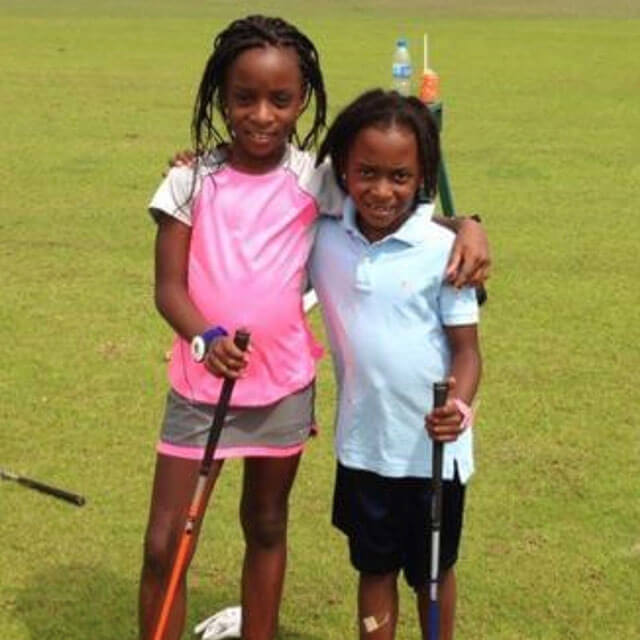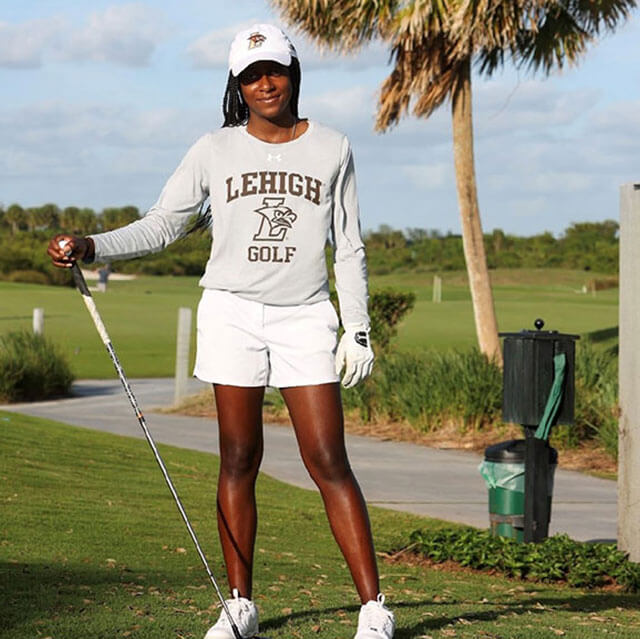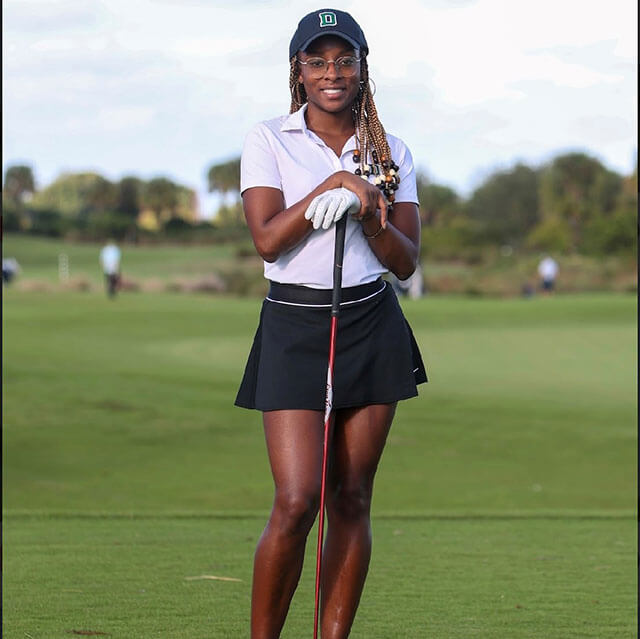How Johns Hopkins Neonatal Care — and Toy Golf Clubs — Gave the Hall Sisters their Drive
Hope and Alana Hall, both born more than two months early, have grown to become accomplished students and golfers.
 Hope and Alana Hall as children
Hope and Alana Hall as childrenWhen Hope Hall was 4 and her sister Alana was 2, therapists at the Kennedy Krieger Institute suggested they find ways to improve their eye-hand coordination and grip strength.
So, their father, Marvin Hall, bought a toy golf set that changed their lives.
Both girls were born prematurely, with Hope weighing just 1.4 pounds and Alana 2.1, and they spent their first months in the neonatal intensive care unit (NICU) at The Johns Hopkins Hospital. After each baby left the NICU, the Owings Mills family continued care at Johns Hopkins through a clinic at the Kennedy Krieger Institute.
Now, Hope is a sophomore at Dartmouth College and the only Black woman currently playing golf for an Ivy League team. Alana, a similarly accomplished golfer and student, is committed to play on the women’s golf team at Lehigh University in the fall.
‘Great Care’ from the NICU Team
“Once we knew we were going to have high-risk pregnancies, we immediately thought of Johns Hopkins,” says their mother, Pamela Hall, who developed gestational hypertension and preeclampsia during both pregnancies.
 Alana Hall, 2023
Alana Hall, 2023While carrying Hope, Pamela’s ankles became noticeably swollen at 27 weeks — a sign that her blood pressure was spiking. She went to The Johns Hopkins Hospital, where Hope was born a week later, on Dec. 5, 2004.
“Everyone there was calm and clear on a plan, which made it that much better, because it was a scary time for us,” Pamela says.
Healthy survival of babies who are premature isn’t unusual, but the Hall sisters stand out for their journey from tiny preemies to athletic and academic superstars.
Babies born at 28 weeks have survival rates of 90% or higher, and nearly 90% of those who live have no lasting health problems.
However, the third trimester is a time of significant organ development. Babies born at 28 weeks don’t have fully developed lungs, so they usually require assistance with breathing. They are at risk for necrotizing enterocolitis, which can cause a hole in the intestines that lets in bacteria. They are also at increased risk for neurological or cardiovascular problems, compromised immune systems and vision or hearing difficulties.
Like many newborns who are premature, Hope faced one challenge after another in her first days.
“Each week we had to battle something,” Pamela says. “We did so in the great care of that team. First, it was all about her lungs and jaundice. Then it was about her intestines.”
Every concern was confronted and surmounted, and after three months, Hope, weighing just 4 pounds, went home. The family returned to the Johns Hopkins NICU when Alana was born nearly two years later, on Oct. 16, 2006, weighing a relatively robust 2.1 pounds and requiring a month in the NICU.
 Hope Hall, 2023
Hope Hall, 2023More Beds, Treatment Advances
Pediatricians such as neonatologists Lawrence Nogee and Frances Northington, who both joined the Johns Hopkins Children’s Center faculty in 1992, say they are thrilled that the sisters are doing so well, and that Marvin and Pamela Hall deserve much of the credit.
When the Hall babies were born in the early 2000s, the NICU was treating babies born as much as 24 weeks early and weighing as little as 1 pound, says Nogee. The smallest ones had about a 60% chance of survival, and of those who lived, about 40% might have had neurological challenges, he says.
Since then, the NICU at Johns Hopkins Children’s Center has grown, from 24 acute care beds in 1992 to 45 today, and treatments have advanced too, with better incubators, a gentler approach to ventilation, and more reliance on parental skin-to-skin contact and maternal or donated breast milk. The survival rate has ticked up, to about 80%, and the NICU team now treats babies as young as 22 or 23 weeks, Nogee says.
The Halls, like many Johns Hopkins NICU families today, continued therapy through a multidisciplinary Kennedy Krieger clinic, now called the Infant Neurodevelopmental Center. Marilee Allen, a professor of pediatrics who joined the Johns Hopkins faculty in 1983 and retired in 2021, created the center in the late 1980s.
“I was not sure we could change outcomes, but I knew how difficult it was for parents,” says Allen. “A major part of my job was to counsel parents as honestly as possible, and to work with them in the clinic with recommendations for how they can work with their child.”
Today’s families work with a care team that could include a neurodevelopmental pediatrician, neonatologist, neurologist or neuropsychologist, as well as physical therapists, occupational therapists, social workers, and speech and language pathologists, depending on the child’s needs, Allen says.
“We like to follow them closely for the first two to three years to make sure they’re getting the interventions they need,” she says. “And then we do a comprehensive assessment to see if they need support for school. If necessary, Kennedy Krieger can follow children into young adulthood.”
Playing the Long Game
The Hall sisters, who stayed with Johns Hopkins for pediatric care, participated in the clinic, which just may be why they’re such incredible golfers and high-achieving scholars today.
“While we were working with the doctors and Kennedy Krieger, they suggested we find something to help advance their motor, hand and eye coordination,” says Marvin.
He decided on golf.
“Hope and Alana and I would go in the basement in our home,” he says. “We had a little green mat. And they would just whack at the little ball. Just to build some hand-eye coordination.”
The girls quickly warmed to the activity, and they soon graduated to real clubs, real golf courses and real competitions, mostly in U.S. Kids Golf tournaments. Hope remembers her first game, at age 6.
“I got second place but with a very high score on nine holes,” she says. “I wasn’t good, but I loved it!”
The family moved around due to Pamela’s engineering career, giving the sisters opportunities to play in Zimbabwe, Scotland, Johannesburg and Abuja, Nigeria. Then the family moved to South Florida, where the girls continued their golf and academic development at Saint Andrew’s School in Boca Raton.
Hope and Alana both predict that golf will always be part of their lives. Alana, who plans to major in civil engineering and architecture at Lehigh, hopes to play in the Ladies Professional Golf Association (LPGA) one day. Her long-term goal is to design golf courses.
Hope, with a more than respectable drive of 265 yards, is majoring in engineering and government at Dartmouth. She hopes to get an M.B.A. and someday work with the LPGA to increase access for women of color.
Being the only Black woman playing golf in the Ivy Leagues brings pressure, Hope says, but she can handle it.
“My dad says pressure is a privilege,” Hope says. “I’m honored, and I think it’s a good step toward making sure golf widens its range and shows that everybody can play.”
